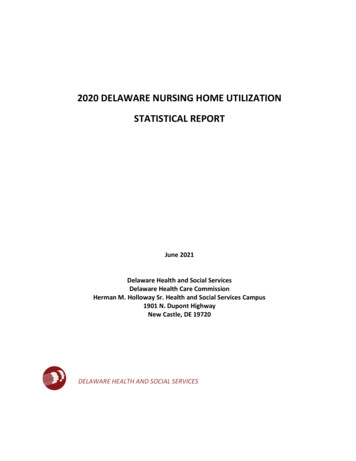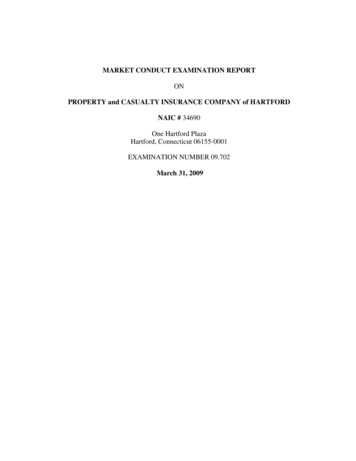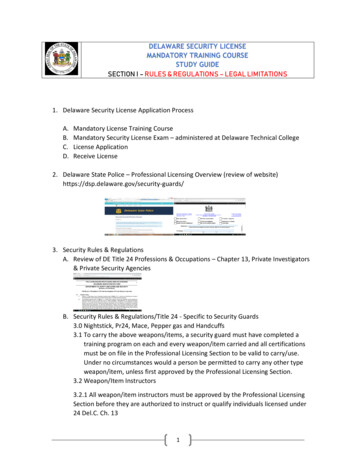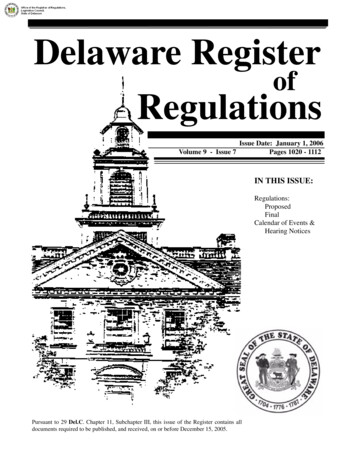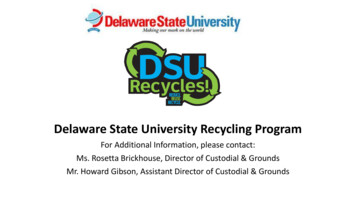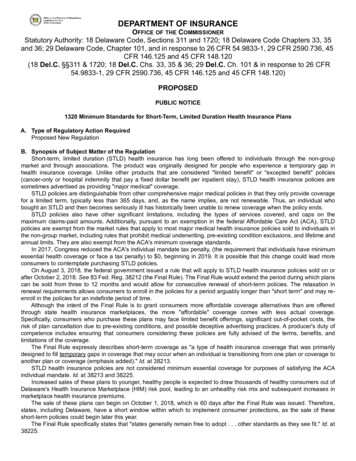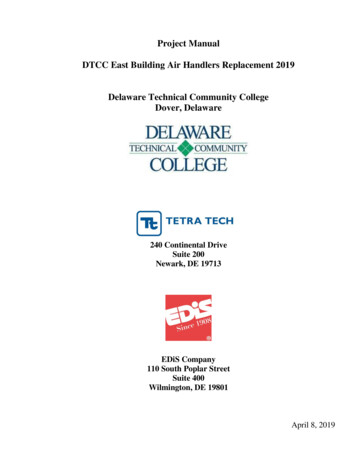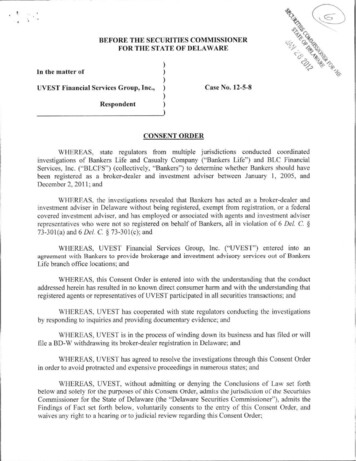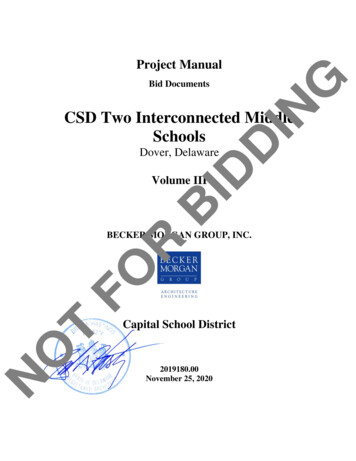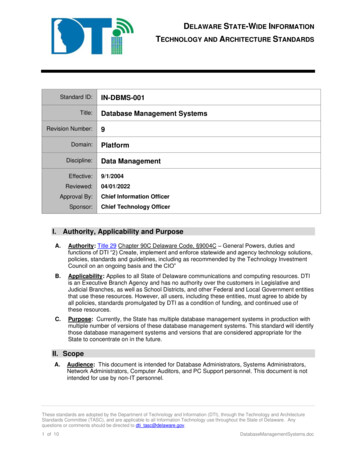
Transcription
DELAWARE STATE-WIDE INFORMATIONTECHNOLOGY AND ARCHITECTURE STANDARDSStandard ID:Title:Revision S-001Database Management Systems9PlatformData Management9/1/200404/01/2022Approval By:Chief Information OfficerSponsor:Chief Technology OfficerI. Authority, Applicability and PurposeA.Authority: Title 29 Chapter 90C Delaware Code, §9004C – General Powers, duties andfunctions of DTI “2) Create, implement and enforce statewide and agency technology solutions,policies, standards and guidelines, including as recommended by the Technology InvestmentCouncil on an ongoing basis and the CIO”B.Applicability: Applies to all State of Delaware communications and computing resources. DTIis an Executive Branch Agency and has no authority over the customers in Legislative andJudicial Branches, as well as School Districts, and other Federal and Local Government entitiesthat use these resources. However, all users, including these entities, must agree to abide byall policies, standards promulgated by DTI as a condition of funding, and continued use ofthese resources.C.Purpose: Currently, the State has multiple database management systems in production withmultiple number of versions of these database management systems. This standard will identifythose database management systems and versions that are considered appropriate for theState to concentrate on in the future.II. ScopeA.Audience: This document is intended for Database Administrators, Systems Administrators,Network Administrators, Computer Auditors, and PC Support personnel. This document is notintended for use by non-IT personnel.These standards are adopted by the Department of Technology and Information (DTI), through the Technology and ArchitectureStandards Committee (TASC), and are applicable to all Information Technology use throughout the State of Delaware. Anyquestions or comments should be directed to dti tasc@delaware.gov.1 of 10DatabaseManagementSystems.doc
DELAWARE STATE-WIDE INFORMATIONTECHNOLOGY AND ARCHITECTURE STANDARDSB.Applicability: This standard will cover all database management systems (DBMS) installed orin use by the State of Delaware, including data owned by the State but housed by third-partycontractors. This standard does not apply to computer systems where the Federal Governmentdictates what DBMS to be used.C.Areas Covered: Only general use DBMS are covered by this standard, not proprietary usedatabases such as laboratory or instrumentation databases, not Document ManagementSystems or specific-use applications like Active Directory, Outlook, e-mail, or Calendaring.When available, a general use DBMS is recommended over a proprietary solution.III. ProcessA.Adoption: These standards have been adopted by the Department of Technology andInformation (DTI) through the Technology and Architecture Standards Committee (TASC) andare applicable to all Information Technology use throughout the State of Delaware.B.Revision: Technology is constantly evolving; therefore the standards will need to be regularlyreviewed. It is the intent of the TASC to review each standard annually. The TASC is open tosuggestions and comments from knowledgeable individuals within the state, although we askthat they be channeled through your Information Resource Manager (IRM).C.Contractors: Contractors or other third parties are required to comply with these standardswhen proposing technology solutions to DTI or other state entities. Failure to do so could resultin rejection by the Delaware Technology Investment Council. For further guidance, or to seekreview of a component that is not rated below, contact the TASC at dti tasc@delaware.gov.D.Implementation responsibility: DTI and/or the organization’s technical staff will implementthese best practices during the course of normal business activities, including business casereview, architectural review, project execution and the design, development, or support ofsystems.E.Enforcement: DTI will enforce these best practices during the course of normal businessactivities, including business case and architectural review of proposed projects and during thedesign, development, or support of systems. These best practices may also be enforced byothers during the course of their normal business activities, including audits and design reviews.Non-compliance could result in costly Extended Support.F.Contact us: Any questions or comments should be directed to dti tasc@delaware.gov.These standards are adopted by the Department of Technology and Information (DTI), through the Technology and ArchitectureStandards Committee (TASC), and are applicable to all Information Technology use throughout the State of Delaware. Anyquestions or comments should be directed to dti tasc@delaware.gov.2 of 10DatabaseManagementSystems.doc
DELAWARE STATE-WIDE INFORMATIONTECHNOLOGY AND ARCHITECTURE STANDARDSIV. Definitions/DeclarationsA. Definitions1.Database: A collection of information organized in such a way that a computer programcan quickly select desired pieces of data. Traditional databases are organized by field,record and file. A field is a single piece of information; a record is one complete set offields; and a file is a collection of records. To access information from a database, adatabase management system (DBMS) is needed. This is a collection of programs thatenables the user to enter, organize, and select data in a database.2.Database Management System (DBMS): A collection of programs that provides thecapability to store, modify, and extract information from a database. There are manydifferent types of DBMS's, ranging from small systems that run on personal computers tolarge systems that run on midrange or mainframes. The terms relational, flat, network andhierarchical all refer to the way a DBMS organizes information internally. The internalorganization can affect how quickly information can be extracted. Requests for informationfrom a database are made in the form of a query, which is a stylized question. The set ofrules for constructing queries is known as a query language. Different DBMS's supportdifferent query languages, although there is a semi-standardized query language calledSQL (structured query language). For the purposes of this document, database anddatabase management system are used interchangeably.3.Scalable: Scalable database is defined as the capability of the database to meetcurrent/future requirements without major effects on the existing structures. A scalabledatabase will easily grow in both size and infrastructure with little or no measurable impacton the performance of the operational database, system, or network4.Enterprise Database: A database or group of databases supporting a Statewide or multiagency function or system with a single administrative authority. A database or group ofdatabases supporting operations deemed critical to the business of the State or agency.5.Desktop DBMS: a type of DBMS which is designed for running small scale databases,generally located on personal computers.6.Mission Critical System: A system that is critical to the functioning of an organization andthe accomplishment of its mission. Therefore, if a mission critical system is lost orunavailable, the agency will be unable to perform some or all of its most basic functions.Also, a system is deemed mission critical if its loss would cause an unacceptableslowdown in the functioning of an agency.7.Personal Workstation: Any computing device engineered to remain stationary thatcontains a hard drive, memory, and CPU (the monitor and keyboard are usually separatepieces from the PC case) and expansion slots. The intent of the device is to be used byone person at a time, or perhaps one person and a print service.These standards are adopted by the Department of Technology and Information (DTI), through the Technology and ArchitectureStandards Committee (TASC), and are applicable to all Information Technology use throughout the State of Delaware. Anyquestions or comments should be directed to dti tasc@delaware.gov.3 of 10DatabaseManagementSystems.doc
DELAWARE STATE-WIDE INFORMATIONTECHNOLOGY AND ARCHITECTURE STANDARDS8.Embedded: An embedded system is some combination of computer hardware andsoftware, either fixed in capability or programmable, that is specifically designed for aparticular kind of application device. Industrial machines, automobiles, medical equipment,cameras, household appliances, airplanes, vending machines, and toys are among thepossible hosts of an embedded system. Embedded systems that are programmable areprovided with a programming interface, and embedded systems programming is aspecialized occupation.9.System Administrator: The human being responsible for running and maintaining acomputer system at the Operating System (OS) level especially a mainframe,minicomputer, or local area network. System administrators, sometimes called networkadministrators, issue login names, maintain security, fix failures, and advise managementabout hardware and software purchases.10. Remote Access: It is a means by which users can gain authenticated access to internalnetwork resources, preferably without posing a security risk to valuable assets within thenetwork.11. Programmable Access: It is a means of reading and updating data in a databasemanagement system through controlled machine instructions.12. Database Administrator: A database administrator (DBA) is a person responsible for thedesign, implementation, maintenance and repair of an organization’s database. A DBAmaintains database logins, maintains database security, monitors performance andperforms database software patches/upgrades.These standards are adopted by the Department of Technology and Information (DTI), through the Technology and ArchitectureStandards Committee (TASC), and are applicable to all Information Technology use throughout the State of Delaware. Anyquestions or comments should be directed to dti tasc@delaware.gov.4 of 10DatabaseManagementSystems.doc
DELAWARE STATE-WIDE INFORMATIONTECHNOLOGY AND ARCHITECTURE STANDARDSB. DeclarationsA DBMS Must:1.Be tunable for performance and space maximization.2.Be scalable.3.Work within the State’s IT Infrastructure.4.Provide the ability to minimize redundant data.5.Be able to secure data structures.6.Contain data integrity facilities;7.a)Provide Point-in-time recoveryb)General backup/restore methodologyc)Ensure that what was intended to be written was, in fact written.Be ‘system administrator’ friendly;a) Contain tunable operational parametersb) Provide tools for modifying data file/table designc) Utility suite for support functionality.8.Provide audit trail capabilities.9.Provide for transaction rollback.10. Have a search/update engine that will accompany the relational database or provide a“vehicle” to interface with existing 3gl/4gl integrated software.11. Adhere to the Software Policy, Delaware Information Security Policy, Systems ArchitectureStandard and Data Management Policy.These standards are adopted by the Department of Technology and Information (DTI), through the Technology and ArchitectureStandards Committee (TASC), and are applicable to all Information Technology use throughout the State of Delaware. Anyquestions or comments should be directed to dti tasc@delaware.gov.5 of 10DatabaseManagementSystems.doc
DELAWARE STATE-WIDE INFORMATIONTECHNOLOGY AND ARCHITECTURE STANDARDSV. Definition of RatingsCOMPONENT RATINGA.USAGE NOTESSTANDARD – DTI offers internal support and/or has arranged forexternal vendor support as well (where applicable). DTI believes thecomponent is robust and can be expected to enjoy a useful life of 3 years from the Effective Date.These components can beused without explicit DTIapproval for both newprojects and enhancementof existing systems.DECLINING – Deprecated - DTI considers the component to be alikely candidate to have support discontinued in the near future. Adeprecated element is one becoming invalid or obsolete.Via the State’s waiverprocess, these componentsmust be explicitly approvedby DTI for all projects. Theymust not be used for minorenhancement and systemmaintenance without explicitDTI approval via the State’swaiver process.DISALLOWED – DTI declares the component to be unacceptable foruse and will actively intervene to disallow its use when discovered.No waiver requests for newsolutions with this componentrating will be considered.Missing Components – No conclusions should be inferred if a specific component is not listed.Instead, contact the TASC to obtain further information.VI. Component AssessmentsA.All DBMS's must be licensed in a manner appropriate to the way they are used and up-to-datewith all appropriate publisher service patches.B.All multiple-user DBMS's must be placed on servers. No multiple-user DBMS will be hosted ona PC.C.All multiple-user DBMS's must be under formal support and approved by the IRM.D.To determine the supported versions for the various release levels, consult the vendor’s website.These standards are adopted by the Department of Technology and Information (DTI), through the Technology and ArchitectureStandards Committee (TASC), and are applicable to all Information Technology use throughout the State of Delaware. Anyquestions or comments should be directed to dti tasc@delaware.gov.6 of 10DatabaseManagementSystems.doc
DELAWARE STATE-WIDE INFORMATIONTECHNOLOGY AND ARCHITECTURE STANDARDSComponentRatingCommentsRelational DBOracle Standard orEnterprise (See Appendix I)StandardGeneral Release LevelsDecliningExtended Support Release LevelsDisallowedDB2 MainframeStandardGeneral Release LevelsDecliningExtended Support Release LevelsDisallowedSQL Server (See Appendix I)General Release LevelsDecliningExtended Support Release LevelsUnsupported Release LevelsStandardThis version of SQL Server can be appropriate fora smaller database where the data size is lessthan 4GB and the end users are limited to a singleorganization.DecliningExtended Support Release LevelsDisallowedPersonal WorkstationDBMSs (e.g., MicrosoftAccess, SQL Server ExpressLocalDB)Unsupported Release LevelsStandardDisallowedSQL Server ExpressUnsupported Release LevelsStandardDisallowedUnsupported Release LevelsFor use on a desktop by one user when theDR/BCP criticality classification is minimal (5) andthe data classification is publicFor a system with a DR/BCP criticalityclassification of limited (4) or higher.Or for a system with a DR/BCP criticalityclassification of minimal (5) and the dataclassification is confidential, secret, or top secret.These standards are adopted by the Department of Technology and Information (DTI), through the Technology and ArchitectureStandards Committee (TASC), and are applicable to all Information Technology use throughout the State of Delaware. Anyquestions or comments should be directed to dti tasc@delaware.gov.7 of 10DatabaseManagementSystems.doc
DELAWARE STATE-WIDE INFORMATIONTECHNOLOGY AND ARCHITECTURE STANDARDSSYBASEDecliningDB2 ServerDecliningOpen Source(General or Extended Support Release Levels)Please review the State Software Policy SoftwarePolicy for Open Source ImplicationsMySQLStandardSupported versions with current patchesPostgreSQLStandardGeneral Release LevelsDeclining9.6.23DisallowedMongoDB (See Appendix I)Less than or equal to 9.5.25StandardGeneral Release LevelsDeclining4.0DisallowedLess than or equal to 3.6DisallowedNo New Development (General or ExtendedSupport Release Levels)Non RelationalIMSAdabasLotus DominoStandardGeneral Support Release LevelsDecliningExtended Support Release LevelsDecliningDatabase server service only (Notes StorageFacility)Version 8.5 and aboveThese standards are adopted by the Department of Technology and Information (DTI), through the Technology and ArchitectureStandards Committee (TASC), and are applicable to all Information Technology use throughout the State of Delaware. Anyquestions or comments should be directed to dti tasc@delaware.gov.8 of 10DatabaseManagementSystems.doc
DELAWARE STATE-WIDE INFORMATIONTECHNOLOGY AND ARCHITECTURE STANDARDSAppendix ILifecycle RoadmapDatabasesDTIOracle 11.2.0.4Oracle 12.1.0.2Oracle 12.2.0.1Oracle 19cMSSQL 2012MSSQL 2014MSSQL 2016MSSQL 2017MSSQL 2019Mongo DB 4.0Mongo DB 4.2VendorOracle 11.2.0.4Oracle 12.1.0.2Oracle 12.2.0.1Oracle 19cMSSQL 2012MSSQL 2014MSSQL 2016MSSQL 2017MSSQL 2019Mongo DB 4.0Mongo DB 4.2Jun-21 Dec-21 Jun-22 Dec-22 Jun-23 Dec-23 Jun-24 Dec-24 Jun-25 lineDeclineEOLDeclineDeclineDeclineGAGAGAGAGeneral Availability - Enterprise-wide standard with full deployment lineGAGADeclineDeclineDeclineDirection is to reduce use and dependence on over time. No newdevelopment. Support Only.EOLRetiring from DTI enterprise. No implementation, development orsupport.Jun-21 Dec-21 Jun-22 Dec-22 Jun-23 Dec-23 Jun-24 Dec-24 Jun-25 Dec-25MDSMDSMDSMDSPaid ESPaid ESPaid ESEOLEOLPS/MSPremier/Mainstream Support - Five years from General Availability SPS/MSPS/MSPS/MSPS/MSPS/MSPS/MSPaid PS/MSPS/MSPS/MSEOLPS/MSPS/MSTBDPaid ESPaid ESESPaid ESMDSLECWaived Extended SupportPaid Extended SupportMarket Driven SupportLimited Error CorrectionReferences for Vendor Support Type details:Oracle:Oracle Software Technical Support Policies GuideMSSQLSVR:Search Product and Services Lifecycle Information - Microsoft Lifecycle Microsoft DocsMONGO DB:MongoDB Software Lifecycle Schedules MongoDBThese standards are adopted by the Department of Technology and Information (DTI), through the Technology and ArchitectureStandards Committee (TASC), and are applicable to all Information Technology use throughout the State of Delaware. Anyquestions or comments should be directed to dti tasc@delaware.gov.9 of 10DatabaseManagementSystems.doc
DELAWARE STATE-WIDE INFORMATIONTECHNOLOGY AND ARCHITECTURE STANDARDSVII. Development and Revision HistoryDateRevision04/01/2022Rev 9. Changes are focused on aligning Component Ratings to Release Levels. ALifecycle Roadmap in Appendix I has also been added to aid with trackingversions and the associated Release Levels.These standards are adopted by the Department of Technology and Information (DTI), through the Technology and ArchitectureStandards Committee (TASC), and are applicable to all Information Technology use throughout the State of Delaware. Anyquestions or comments should be directed to dti tasc@delaware.gov.10 of 10DatabaseManagementSystems.doc
those database management systems and versions that are considered appropriate for the State to concentrate on in the future. II. Scope A. Audience: This document is intended for Database Administrators, Systems Administrators, Network Administrators, Computer Auditors, and PC Support personnel. This document is not
